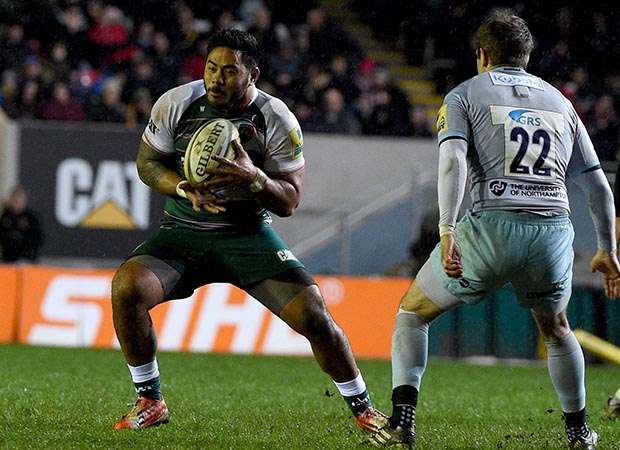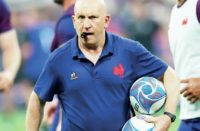 Eddie Jones has picked his first squad, and I'm encouraged. My gut feeling is that this is the era in which if players cannot deliver then they won't be around for long. Jones has already upped-the-ante in terms of performance, and the message is that the culture of ‘credit in the bank' and forgiveness for below par performances is gone.
Eddie Jones has picked his first squad, and I'm encouraged. My gut feeling is that this is the era in which if players cannot deliver then they won't be around for long. Jones has already upped-the-ante in terms of performance, and the message is that the culture of ‘credit in the bank' and forgiveness for below par performances is gone.
Jones has taken on the responsibility for the attack, and I expect him to have a big influence. He has started by stressing the importance of England's traditional strengths at the set-piece, because what happens at scrums, line-outs and mauls is the base everything works from.
The point of difference in any Test side is the attack, and it's the hardest area to develop because it makes you think hardest and requires the most skill. New Zealand have become the best exponents of attack by narrowing it down to quick ball, a counter-attacking approach, speed, accuracy, and running straight lines. They also have players who can deliver. When they are presented with attacking options they know how to execute.
People think it's complicated, but actually its beauty is it is very simple. For instance, you don't see the All Blacks constantly using the Rugby League tactic of passing the ball behind a player who is in front of the intended receiver. They do it occasionally, but mainly their attack is based on hard work, with players who are massively fit and full of energy carrying strongly or running off the ball.
It is noticeable that all the young players that Eddie Jones has selected have high energy, and whether it's Elliot Daly in the backs, or forwards like Jack Clifford, Maro Itoje and Paul Hill they all have the capacity to run, pass and attack hard.
In modern Test rugby it's essential that you have four or five ball-carriers in the pack who can come onto the ball at pace, hammer the defence, and slip the ball out of the contact area. Those young forwards, and existing ones like George Kruis, bring that fitness, energy and smartness. If you combine that with the likes of George Ford and Owen Farrell at fly-half, Daly or Jonathan Joseph at outside-centre, and any of the back three, then you should be in business in attack.
In the last four years England have had a few highs and plenty of lows, and it's noticeable that the energy was never constant, and nor was consistency. That suggests a lack of peak fitness – and if you don't have high fitness levels I don't know how you can play Test rugby.
Consistency has been a problem for England. For instance, to be successful the 9-10 combination cannot change anywhere near as much as it has in the last four years. It's a given that scrum-half and fly-half are crucial to the way a team plays.
At No.9 it is a tough decision who to pick when Ben Youngs and Danny Care are at their best, because both are very good attacking scrum-halves. However what neither of them have been able to do is to string together 20 consistently good Tests.
At fly-half Ford was dropped during the World Cup for Farrell for no clear reason – although, to be fair to Farrell, he played well. That sort of disappointment could dent a player's confidence, although I don't think that is the case with Ford. His goal-kicking is still 80 per cent, so it's not been badly affected, and although he's made a few mistakes behind a Bath side which hasn't played well, when he's been given good ball – as against Toulon – he's played well.
If you're talking solely about attack, Ford, left, would be your fly-half all day long – but rugby is more complicated than that. Farrell is an established international, and there's a lot to be said for a player with his level of confidence. His temperament and focus has been almost unrivalled since he broke into the England team.
The key in any backline is balance, and achieving that will be one of Eddie Jones' biggest challenges. At international level Ford ideally needs to play alongside a bigger man – and that's why pairing him alongside Henry Slade at 12 would be a question mark. Farrell is also a better 10 than he is a 12, and so the same applies to the Jones suggestion that he could make the move to inside-centre.
Jones moving Manu Tuilagi to 12 is another matter, because he could be a very good inside-centre. We've almost forgotten after 15 months out of the game – which is a span of almost 20 missed Test caps – what Manu is like. His importance to England's overall attacking plan can't be underestimated, and nor can his explosiveness.
My only advice is that, for Tuilagi to thrive in the Jones regime, he has to come back fitter. Up until now he has been picked for England at 80 to 90 per cent fitness, but to be the player who Jones wants, and to fulfil his potential, he has to focus.
He is a player who can make something out of nothing – and he could do it more often were he is supremely fit.
Marland Yarde is a wing who can smash people aside, as he showed on the New Zealand tour in 2014, but if you have Ford 10, Farrell 12 and Daly 13, and add a back three of Anthony Watson, Jack Nowell and Mike Brown, it doesn't look too powerful and aggressive.
That's why I would have liked a Matt Banahan or Semesa Rokoduguni included to give the backline more size and heft. Watson and Nowell have the fancy footwork and changes of direction, but it is much easier as a forward to track and get close to someone who runs straight.
It is all about communication and instinct. When you are shown by your parents how to ride a bike they put hours into explaining it.
Then, when you get how to do it, there is a massive sense of elation when you find you can do it on your own. It's the same with rugby coaching through conversations on the training ground. First you talk about recognising how to exploit space and then in training you start applying it until you are doing it instinctively. Some players pick it up very quickly, some are slower, and some cannot do it. Jones will find out who can and cannot quite quickly.
My playing environments were special because I was surrounded by bloody good players. They were already in ‘sync' with each other, and I had to learn how to sync with them, whether with Bath or England.
Jones has made a good start by retaining who he thinks is good enough from the existing squad, and by bringing in the youth that he thinks could be good enough to sync with them.


























